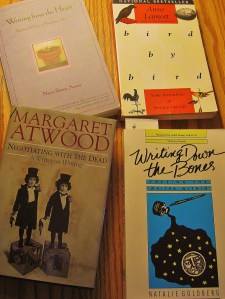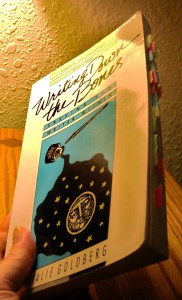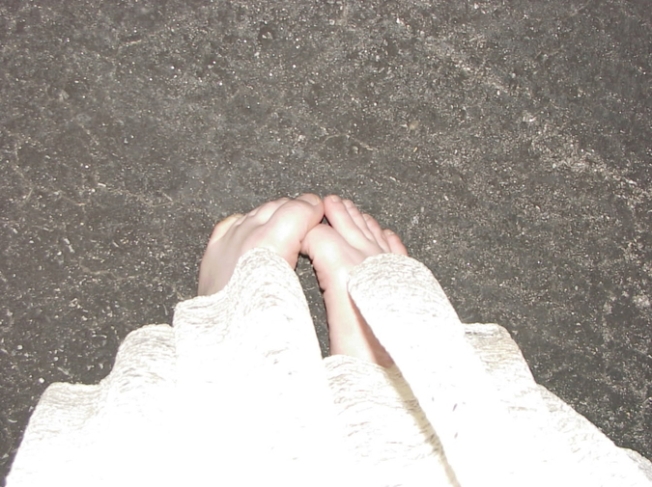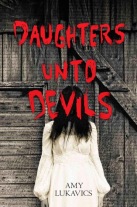Though the words may differ, the advice is always the same: If you are a writer, you must also read–widely and often. Among my stacks of lit magazines, poetry collections, young adult novels, encyclopedias of paranormal/supernatural phenomenon, and geography/history resources are quite a few books on writing. I pulled these 4 to show you:
 Writing from the Heart: Tapping the Power of Your Inner Voice by Nancy Slonim Aronie (top left)
Writing from the Heart: Tapping the Power of Your Inner Voice by Nancy Slonim Aronie (top left)
Bird by Bird: Some Instructions on Writing and Life by Anne Lamott (top right)
Negotiating with the Dead: A Writer on Writing by Margaret Atwood (bottom left)
Writing Down the Bones: Freeing the Writer Within by Natalie Goldberg (bottom right)
There are others–such as Stephen King’s On Writing and most of Janet Burroway’s guides on narrative craft–that I return to often. But these are the books I’ve heavily marked with scribbled notes in the margins and little fluorescent tabs sticking out the sides.
In Ms. Aronie’s Writing from the Heart, I like the practical exercises she prescribes.
Write about a lie you told. Do not soften the circumstances. Be tough but gentle. Be tough in writing the truth, but be gentle on yourself. You were just being human. Do you think you’re the only person who lied to get what you wanted?
Write about a lie that was told to you. (p. 72)
From Bird by Bird, Ms. Lamott tells us
One of the gifts of being a writer is that it gives you an excuse to do things, to go places and explore. Another is that writing motivates you to look closely at life, at life as it lurches by and tramps around. (p. xii)
There is a door we all want to walk through, and writing can help you find it and open it. Writing can give you what having a baby can give you: it can get you to start paying attention, can help you soften, can wake you up. But publishing won’t do any of those things; you’ll never get in that way. (p. 13)
In Negotiating with the Dead, Ms. Atwood lets us know that “it is artists who possess the secret identities, the secret powers, and — if posterity goes their way — the last laugh… As for artists who are also writers, they are doubles twice  times over, for the mere act of writing splits the self into two.” (p. 32)
times over, for the mere act of writing splits the self into two.” (p. 32)
As you can see from the picture to the right, my copy of Writing Down the Bones is dense with tabs. I read Ms. Goldberg’s book while riding the bus to David Zimmerman’s novel writing class one summer in grad school at Iowa State University. In addition to the assigned and workshop readings, I chose to dive into this book that was recommended to me by a professor while I was still an undergrad at Simpson College. I believe it was one of those situations where it meant more when I finally got around to reading it, more than if I had read it back then. As if the right time would present itself, like a chance encounter with a person who’d been placed in your life precisely when you needed them the most. Such is a good book.
In Writing Down the Bones, Ms. Goldberg discusses the way we have to distance ourselves from the place (be it a physical or an emotional state) we need to write about. She gives the following metaphor:
Our senses by themselves are dumb. They take in experience, but they need the richness of sifting for a while through our consciousness and through our whole bodies. I call this “composting.” Our bodies are garbage heaps: we collect experience, and from the decomposition of the thrown-out eggshells, spinach leaves, coffee grinds, and old steak bones of our minds come nitrogen, heat, and very fertile soil. Out of this fertile soil bloom our poems and stories. But this does not come all at once. It takes time. Continue to turn over and over the organic details of your life until some of them fall through the garbage of discursive thoughts to the solid ground of black soil. (p. 14)
While writing, I return to these works often, and I may mention them again here.
How about you? What are you reading? What gives you inspiration? Whose advice do you find yourself returning to, time and again?




